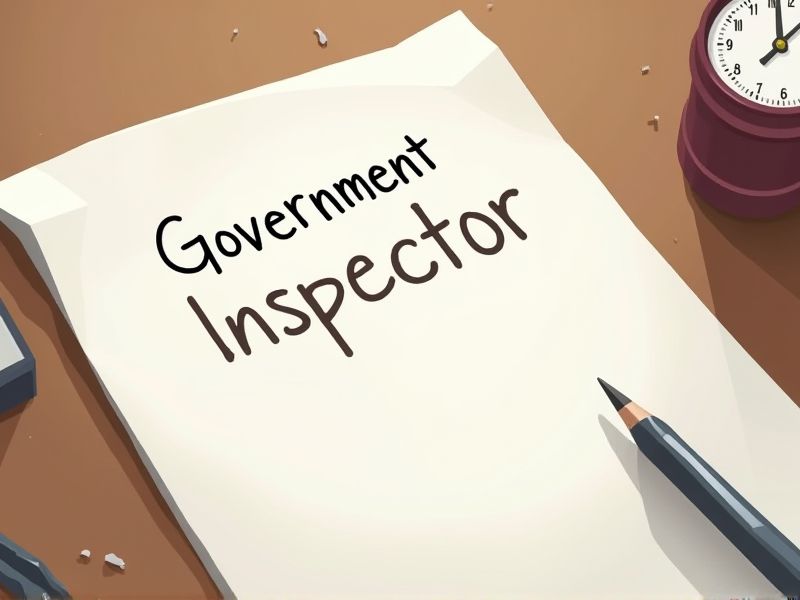
Government inspectors play a crucial role in ensuring compliance with laws and regulations to maintain public safety and trust. Certifications are essential as they equip inspectors with specialized knowledge and skills necessary for accurately assessing various compliance aspects. These certifications also validate the credibility and professionalism required to effectively identify and mitigate potential risks. Key certifications necessary for a Government Inspector include the following.
Certified Fraud Examiner (CFE)
Government agencies frequently deal with complex financial transactions and sensitive information, increasing the risk of fraud. The expertise of a Certified Fraud Examiner (CFE) significantly enhances the ability to detect and investigate fraudulent activities. CFEs bring specialized skills in fraud prevention, detection, and deterrence, which supports the integrity of government operations. This proficiency is crucial for maintaining public trust and ensuring efficient use of taxpayer money.
Certified Government Auditing Professional (CGAP)
Government Inspectors engage in auditing processes that demand expertise in governmental standards, which CGAP certification ensures. The certification provides specialized knowledge in public finance and controls, enhancing effectiveness in detecting irregularities. Possession of a CGAP elevates credibility and trust with stakeholders due to its recognized professional standard. The rigorous training in CGAP also equips inspectors with tools to improve accountability and governance frameworks.
Certified Internal Auditor (CIA)
Having a Certified Internal Auditor ensures a standardized level of competence and knowledge in evaluating and improving governmental processes. This certification provides the necessary expertise to identify risks and inefficiencies, enhancing the integrity and accountability of government operations. Trained CIAs offer an objective perspective, enabling them to detect and mitigate potential fraud or mismanagement within public sectors. Their skills improve audit quality and compliance, vital for maintaining public trust and ensuring transparent use of resources.
Certified Quality Auditor (CQA)
A Certified Quality Auditor (CQA) enriches Government Inspectors with advanced skills to methodically assess processes and ensure compliance with regulatory standards. By having a CQA, accuracy in evaluating government projects and contracts significantly increases, reducing potential waste and corruption. CQAs provide a structured approach to audits, resulting in improved accountability and transparency in public administration. Government operations face fewer inefficiencies when inspectors are trained in systematic quality assurance methods.
Certified Public Accountant (CPA)
Governments require a Certified Public Accountant (CPA) for inspection roles to ensure financial integrity and compliance with established regulations. The CPA's expertise in auditing and financial analysis allows for thorough examination of government accounts, safeguarding against misappropriation. A CPA provides a systematic approach to identifying financial discrepancies, which aids in maintaining transparency. Their certification guarantees that the inspector has met rigorous educational and ethical standards, essential for trustworthy oversight.
Certified Compliance and Ethics Professional (CCEP)
The CCEP credential ensures a government inspector understands crucial compliance standards. This certification enhances the inspector's ability to identify and mitigate ethical risks within governmental operations. It provides a framework for establishing effective compliance programs, fostering public trust. Government agencies benefit from inspectors with CCEP qualifications, as it aligns their oversight with international best practices.
Lean Six Sigma Black Belt Certification
Lean Six Sigma Black Belt Certification equips government inspectors with advanced problem-solving skills, leading to improved process efficiency in public sector operations. The certification fosters a culture of continuous improvement, which is essential for reducing waste and optimizing resource allocation. Government inspectors with this qualification can better ensure compliance and quality standards through data-driven decision-making. Enhanced analytical techniques gained from the certification help in identifying and mitigating potential risks, which is crucial for maintaining public safety and trust.
Project Management Professional (PMP)
Government inspectors often handle complex projects that require coordination across multiple departments. Possessing a Project Management Professional (PMP) certification equips them with standardized methodologies and tools to manage these projects efficiently. This certification also enhances their ability to set realistic goals, allocate resources effectively, and meet regulatory compliance. Consequently, it reduces the likelihood of project delays and cost overruns, ensuring taxpayer money is well-spent.
OSHA Safety Certification
Government inspectors with OSHA Safety Certification possess the knowledge necessary to evaluate workplace compliance with current safety standards. The certification ensures inspectors can identify potential hazards, reducing injury risks for workers. Mastery of OSHA guidelines helps maintain legal and ethical safety levels across industries. Certification enhances credibility, fostering trust between government agencies and the entities they regulate.
Certified in Financial Forensics (CFF)
The CFF certification equips a government inspector with specialized forensic accounting skills to effectively analyze complex financial data, which is crucial for detecting fraud and corruption within government entities. This expertise enhances the accuracy and depth of fraud investigations, leading to more informed and transparent decisions. Government oversight demands a high level of integrity and accountability, and having CFF certification signifies a commitment to these standards. With financial crimes becoming increasingly sophisticated, possessing CFF credentials ensures that inspectors are prepared to safeguard public resources effectively.
Summary
As a reader, you can anticipate improved oversight and adherence to high standards when a Government Inspector gains certifications. This professional validation typically enhances the inspector's skillset and credibility. Enhanced credentials may lead to more accurate assessments and reduced errors in regulatory processes. Consequently, such certifications can promote public trust and ensure compliance with established laws and regulations.
